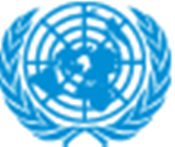
The United Nations, founded in 1945, presently brings together 193 States gathered around
four objectives: maintenance of peace in the world, development of friendly
relations between nations, support nations to work together to help the poor
improve their condition, overcome hunger, disease, and
illiteracy and to encourage respect for human rights coordinating the nations’ action
towards achieving these goals.
Peacekeeping
The UN was created to "save
succeeding generations from the scourge of war" and one of its main
objectives is to maintain international peace and security.
Peacekeeping, although not explicitly
provided for in the Charter, has become one of the main instruments used by the
United Nations to achieve this goal. Over the years, the range of tasks
assigned to UN peacekeeping operations has expanded significantly in response
to changing patterns of conflict and to better respond to threats to
international peace and security.
To know more:
https://peacekeeping.un.org/en
The MHA Security Forces have been present,since the nineties of the last century, in the United Nations peace missionsand place experts in key places of the Organization.
Ministerial Meetings on UN Peacekeeping Missions
Mostly held
approximately every two years, and as a high-level political forum created to
discuss the priorities and future of peacekeeping and security missions, these
meetings, which currently have six editions, the first of which was held in
2016 (London), following the 2015 Leaders' Summit on Peacekeeping (New York),
are an important mechanism for mobilising voluntary contributions from each
member state to strengthen the effectiveness of UN peacekeeping missions.
Thus, the 6th
Ministerial Meeting Peacekeeping 2025 (Berlin, 13 and 14 May), on the theme
Capacity Building, Partnerships and the future of Peacekeeping, brought
together delegations from 134 of its member states (51 of which were
represented at ministerial level), as well as regional organisations and
observers, from which a set of commitments (pledges) were made to ensure that
the material and financial capacity building needs of this international body
were met, This has resulted in important contributions from 74 member states,
including Portugal, which has reaffirmed its support for United Nations peace
operations through contributions aimed at strengthening and building capacity
in areas such as Uniformed Capabilities; Peacekeeping Training, Capacity
Building and Partnerships; Environment and Women, Peace and Security, in the
form of financial contributions totalling €125. 000.00, broken down as follows:
- Peacekeeping
Training, Capacity Building and Partnerships - €50,000.00 for a
Telemedicine project under the Triangular
Partnerships Programme (TPP), which aims to improve access to
medical care in peacekeeping missions;
- Environment
- €25,000.00 to support the improvement of sanitation conditions;
- Women,
Peace and Security - €50,000.00 to organise training courses under the Senior
Women Talent Pipeline (SWTP), dedicated to increasing the
participation of civilian women in UN peace operations, as a key element
in the Gender Parity Strategy.
In this context, the portuguese MHA also expressed its
willingness to commit a Specialised Police
Team (SPT) to public order management and its willingness to
develop initiatives and training actions on environmental and climate risks and
climate adaptation within the scope of Capacity Building and Partnerships for
Peacekeeping, commitments that will be promoted by the Public Security Police
(PSP).
To know more:
https://peacekeeping.un.org/en/un-peacekeeping-ministerials
The promotion of human rights
Since 1948, with the Universal Declaration of Human Rights, the UN
has been protecting human rights through legal instruments and activities on
the terrain. The Human Rights Council, created in 2006, is today the UN's main
independent intergovernmental body responsible for human rights. The different
Committees of independent experts monitor the implementation of the main
international human rights treaties. Each signatory State of a treaty has an
obligation to take steps to ensure that everyone in the State can enjoy the
rights set out in the treaty.
Main instruments
- International Covenant on Civil
and Political Rights
- International Covenant on Economic,
Social, and Cultural Rights
- International Convention on the
Elimination of All Forms of Racial Discrimination
- Convention on the Elimination of
All Forms of Discrimination Against Women
- Convention against Torture and
Other Cruel, Inhuman or Degrading Treatment or Punishment